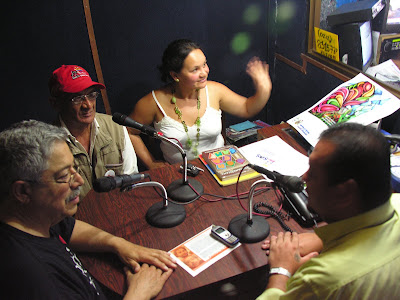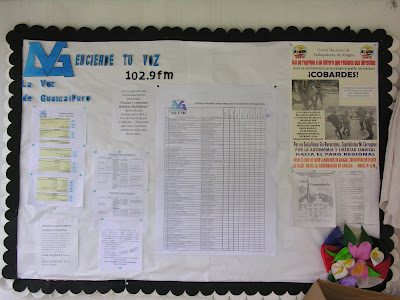 Daniel Del Solar recently visited a small radio station in Venezuela in the region known as Los Teques.
Daniel Del Solar recently visited a small radio station in Venezuela in the region known as Los Teques.  The studio has a large portrait of Oscar Romero, the priest who was killed by death squads of the right wing government in El Salvador.
The studio has a large portrait of Oscar Romero, the priest who was killed by death squads of the right wing government in El Salvador. The radio station has an emphasis on ecology.
The radio station has an emphasis on ecology. Daniel del Solar was interviewed on their afternoon talk show.
Daniel del Solar was interviewed on their afternoon talk show. Their bulletin board lists tasks to be performed by volunteers and scheduled meetings.
Their bulletin board lists tasks to be performed by volunteers and scheduled meetings. This is their disk and record archive. They have three small rooms in a mountainous neighborhood outside of Caracas.
This is their disk and record archive. They have three small rooms in a mountainous neighborhood outside of Caracas.  This Guaicaipuro station is very small. This is the engineer. Community radio in Venezuela has been growing in the past few years. The spectrum which was used mostly by large commercial stations is now divided between many small community radio and tv channels. A few weeks ago the Venezuelan government denied the renewal of a license for transmission of RCTV, a large commercial station, charging that the station had been instrumental in fomenting and supporting the attempted coup. This caused a great deal of reaction by the corporate press and many NGOS in the US, who saw this as censorship. Despite those charges, that station was not "closed down" -- they did lose their government license to the public airwavess but the right wing commercial station continues with their anti-Chavez attacks on cable and the internet. The spectrum that they were using will be divided between thirty small community stations. (However this claim which I got from a response article is disputed by the comment below from the director of Artevision and a producer at Simon Bolivar University in Venezuela .)
This Guaicaipuro station is very small. This is the engineer. Community radio in Venezuela has been growing in the past few years. The spectrum which was used mostly by large commercial stations is now divided between many small community radio and tv channels. A few weeks ago the Venezuelan government denied the renewal of a license for transmission of RCTV, a large commercial station, charging that the station had been instrumental in fomenting and supporting the attempted coup. This caused a great deal of reaction by the corporate press and many NGOS in the US, who saw this as censorship. Despite those charges, that station was not "closed down" -- they did lose their government license to the public airwavess but the right wing commercial station continues with their anti-Chavez attacks on cable and the internet. The spectrum that they were using will be divided between thirty small community stations. (However this claim which I got from a response article is disputed by the comment below from the director of Artevision and a producer at Simon Bolivar University in Venezuela .) Radio Guaicaipuro is one of the many community media outlets which has been supported by the Chavez government.
Radio Guaicaipuro is one of the many community media outlets which has been supported by the Chavez government.
Comments: Anonymous said... With all due respect, but I find your comments at least inaccurate and frankly, very misleading. For instance, when you say "that station was not closed down - they did lose their government license to the public airwavess but the right wing commercial station continues with their anti-Chavez attacks on cable and the internet." you seem to ignore that only 15% of Venezuelans have access to Internet or Cable TV. The truth is that for the vast majority of Venezuelans the station has been in fact "shut down". They are not longer allowed to watch it, if they wanted to. Also when you say "The spectrum that they were using will be divided between thirty small community stations" you seem to be badly misinformed. Firstly, this is not technically possible, but more important, the spectrum is being used by a new state-controlled TV station (the 5th) called TVes. It is very hard to believe that you didn't know that. RCTV was not only shut down, but its broadcasting network was confiscated by the State. In fact, TVes is currently using this equipment - for free- to reach the Venezuelan audiences. Finally, community stations are a great idea. Some of them existed before Chavez came into power and did a very good job for their communities. Unfortunately, during Mr Chavez administration the vast majority of them has been converted into government propaganda outlets. With the government having the right to close stations whenever it wants, and being the only source of funding for this so called "community" stations, believing that these stations are truly independent voices is just a very naive dream Truly yours, Rafael Hidalgo 4:49 AM DeeDee Halleck said... Thanks for your comment. I had read an earlier comment that there would be 30 smaller stations set up-- perhaps they are local versions of TVes? If you are the same Rafael Hidalgo who runs Artevision, could you give any information about what sorts of pressures you are getting from the government or from outside sources, funding and other wise? Given the long history of destabilization by the US of progressive states within Latin America, I would think that there is a big opportunity now from places like the Inter American Development Bank, World Bank, etc, for those who would be willing to take a strong anti-Chavez stand. By the way, I did a film called The Gringo in Mañanaland about the US and Latin America. I have a spanish version which I could send to you. dhalleck@ucsd.edu